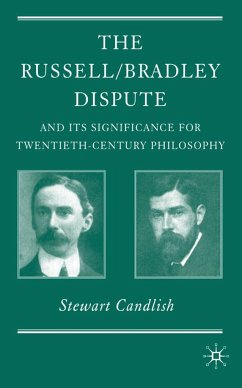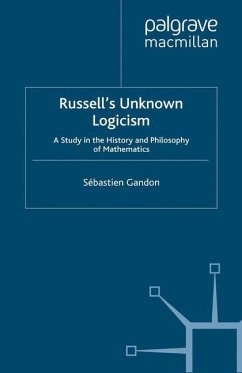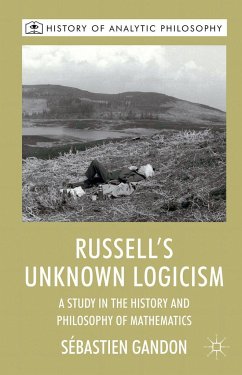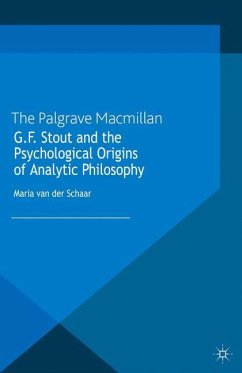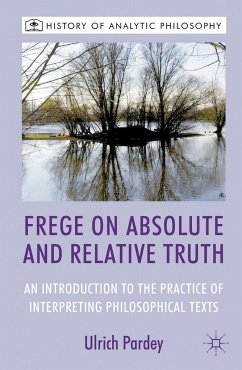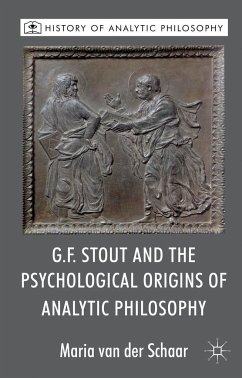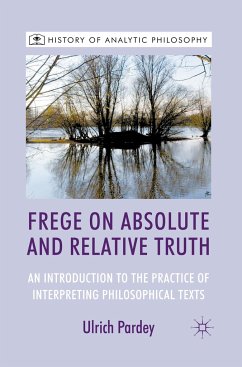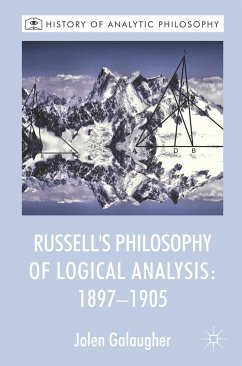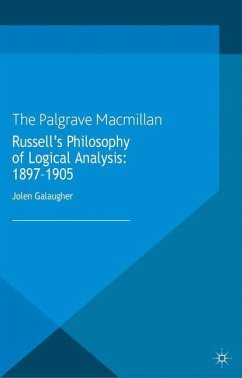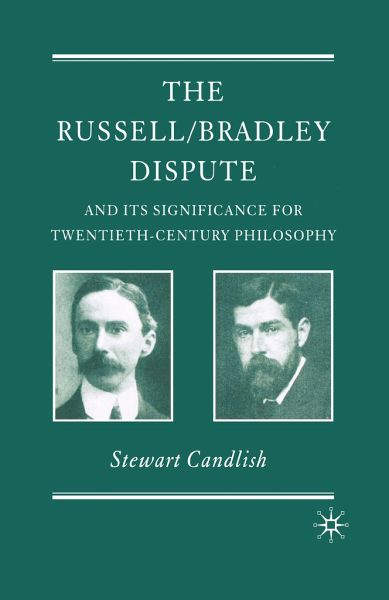
S. Candlish
Broschiertes Buch
The Russell/Bradley Dispute and its Significance for Twentieth Century Philosophy
Versandkostenfrei!
Versandfertig in 6-10 Tagen
Weitere Ausgaben:

PAYBACK Punkte
42 °P sammeln!





In the early twentieth century, an apparently obscure philosophical debate took place between F.H. Bradley and Bertrand Russell. The outcome was momentous: the demise of British Idealism and the rise of analytic philosophy. Stewart Candlish examines afresh this formative period in twentieth-cenutry thought and comes to some surprising conclusions.
STEWART CANDLISH is Editor of the Australasian Journal of Philosophy and Fellow of the Australian Academy of the Humanities.
Produktdetails
- History of Analytic Philosophy
- Verlag: Palgrave Macmillan / Palgrave Macmillan UK / Springer Palgrave Macmillan
- Artikelnr. des Verlages: 978-0-230-23051-4
- 2007
- Seitenzahl: 256
- Erscheinungstermin: 28. November 2006
- Englisch
- Abmessung: 216mm x 140mm x 15mm
- Gewicht: 327g
- ISBN-13: 9780230230514
- ISBN-10: 0230230512
- Artikelnr.: 26399818
Herstellerkennzeichnung
Palgrave Macmillan
Tiergartenstr. 17
69121 Heidelberg
ProductSafety@springernature.com
'What Candlish achieves is not only a detailed exploration of the philosophical dispute between Russell and Bradley (that is, between Analytical Philosophy and its immediate ancestor), but also an explanation of why that dispute is philosophically and historically significant. As such it is not only revealing about why Russell attached great importance to Bradley's criticisms; it is also compelling as a case for why those of us continuing to pursue the Russellian project have much to learn from revisiting the dispute.' - Graham Stevens, Department of Philosophy, University of Manchester
'Stewart Candlish's elegant, iconoclastic study of the Bradley/Russell dispute puts the arguments, the stakes, and the outcome into an entirely new
'Stewart Candlish's elegant, iconoclastic study of the Bradley/Russell dispute puts the arguments, the stakes, and the outcome into an entirely new
Mehr anzeigen
perspective. It should be required reading for anyone even tempted by a Whiggish interpretation of the history of recent philosophy.' - James W. Allard, Department of History and Philosophy, Montana State University
'This excellent analysis of the dispute between Russell and Bradley makes a substantial contribution to our understanding of the origins of twentieth-century philosophy. Anchored in a detailed knowledge of the texts it advances beyond more simplistic versions of their disagreement to offer new and important analyses of the points at issue between these two great philosophers. It is a book that all subsequent scholars will need to take account of. The writing is as clear and precise as it is fluid and engaging.' - William Mander, Harris Manchester College, Oxford University
'Candlish offers an important contribution to the debate over British idealism and the origins of Analytic Philosophy, the clarity of which shows the benefits of teaching his material - a benefit which, he concedes, Bradley's obscure writings did not receive.' - Andy Hamilton, Durham University
'Stewart Candlish's book is to be warmly welcomed for its careful and instructive analyses Throughout the book, Candlish does a superb job in distinguishing what needs to be distinguished, in clarifying the philosophical problems, in charting the development of the relevant views of both Russell and Bradley, and in sorting out the confusions and misunderstandings on both sides.' Michael Beaney, Collingwood and British Idealism Studies
'This is a rich book...it is at once a valuable contribution to our understanding of the dispute between Russell and Bradley and to our understanding of the philosophical subject matter of that dispute.' - Jeff Speaks, Australian Journal of Philosophy
'Candlish's careful and insightful reexamination of a crucial episode in the early history of analytic philosophy is a very important addition to the existing literature on Bradley, Russell, and our recent past...It is highly recommended to anyone even slightly tempted by the idea that philosophy should leave its history behind.' - Internationale Zeitschrift fuer Philosophie
'[a] thoughtful, careful, and gracefully written book.' - James Levine, Notre Dame Philosophical Reviews
'This excellent analysis of the dispute between Russell and Bradley makes a substantial contribution to our understanding of the origins of twentieth-century philosophy. Anchored in a detailed knowledge of the texts it advances beyond more simplistic versions of their disagreement to offer new and important analyses of the points at issue between these two great philosophers. It is a book that all subsequent scholars will need to take account of. The writing is as clear and precise as it is fluid and engaging.' - William Mander, Harris Manchester College, Oxford University
'Candlish offers an important contribution to the debate over British idealism and the origins of Analytic Philosophy, the clarity of which shows the benefits of teaching his material - a benefit which, he concedes, Bradley's obscure writings did not receive.' - Andy Hamilton, Durham University
'Stewart Candlish's book is to be warmly welcomed for its careful and instructive analyses Throughout the book, Candlish does a superb job in distinguishing what needs to be distinguished, in clarifying the philosophical problems, in charting the development of the relevant views of both Russell and Bradley, and in sorting out the confusions and misunderstandings on both sides.' Michael Beaney, Collingwood and British Idealism Studies
'This is a rich book...it is at once a valuable contribution to our understanding of the dispute between Russell and Bradley and to our understanding of the philosophical subject matter of that dispute.' - Jeff Speaks, Australian Journal of Philosophy
'Candlish's careful and insightful reexamination of a crucial episode in the early history of analytic philosophy is a very important addition to the existing literature on Bradley, Russell, and our recent past...It is highly recommended to anyone even slightly tempted by the idea that philosophy should leave its history behind.' - Internationale Zeitschrift fuer Philosophie
'[a] thoughtful, careful, and gracefully written book.' - James Levine, Notre Dame Philosophical Reviews
Schließen
Für dieses Produkt wurde noch keine Bewertung abgegeben. Wir würden uns sehr freuen, wenn du die erste Bewertung schreibst!
Eine Bewertung schreiben
Eine Bewertung schreiben
Andere Kunden interessierten sich für




